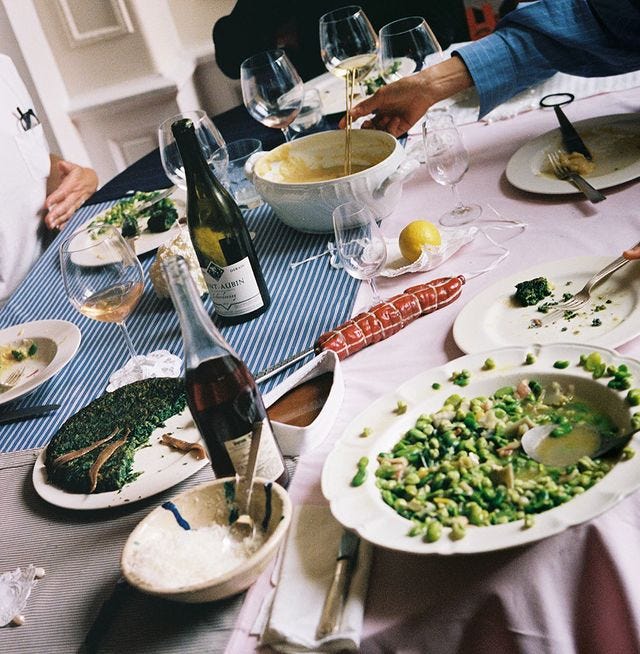#63: Three Things that got me thinking
🪶shame of neediness + ♠️ poker decisions + 🥖surrealist shopping
Bonjour!
Here are three things that made me think about our motivations:
a crane-fiancée denying her own needs
Poker wisdom for life
the price of surrealism
Off we go.
1. Plucking our own feathers
Do take the time to read The Crane Wife by CJ Hauser, published by The Paris Review in 20191. It’s a beautiful, relatable, delicately woven story of a woman reconciling herself—with the gentle help of a “weird group” of people studying birds on the gulf coast of Texas—to the very normal, legitimate needs that she’s spent years suppressing.
It turns out, if you want to save a species, you don’t spend your time staring at the bird you want to save. You look at the things it relies on to live instead. You ask if there is enough to eat and drink. You ask if there is a safe place to sleep. Is there enough here to survive?
…
And I tell people the story of being cheated on because that story is simple. People know how it goes. But it’s harder to tell the story of how I convinced myself I didn’t need what was necessary to survive. How I convinced myself it was my lack of needs that made me worthy of love.


2. Ask why; don’t judge
I enjoyed reading The Biggest Bluff. How I learned to Pay Attention, Take Control and Master the Odds, by writer Maria Konnikova. In the book, Konnikova chronicles her fast-track journey to become a pro poker player— with the help of some of the world’s best players, and of her own psychology background2.
You don’t need to be fond of Las Vegas casinos, or to know what a flush or a big blind is, to enjoy Konnikova’s insights about decision-making and biases, luck and skill. For instance:
Never do anything, no matter how small it may seem, without asking why, precisely, you’re doing it. And never judge anything others do without asking the same question. […] “Even terrible players make the plays they make for a reason, and it’s your job to figure it out,” [Phil Galfond] tells me. “When a hand is a show down, try to walk back through your opponent’s decision and come up with reasons they might have had for taking the actions they did.” Don’t judge them. Don’t berate them, even in your head, by thinking what an awful play they’ve made—a bad bet, a crazy call, an insane raise. Just try to figure out the why behind it.
It’s powerful advice. How often do we go off on someone for making a decision that we, personally, wouldn’t have made, calling them an idiot, fuming, getting angry? How much time and emotional energy we’d save if we simply learned to ask yourselves why they acted as they did, rather than judge, make presumptions, and react. And how much money we’d save on bills for our shrink if we paused to ask the same about our own actions and motivations.


3. Ceci n’est pas à un sac à pain
Finally: Why Would Anyone buy a $-239 black satin bag for their baguette? (Via Sara Petersen, who unravels what ‘momfluencers’ are trying to sell us in her newsletter In Pursuit of Clean Countertops.)
I guess this is like a premium version of ironically buying a nostril-shaped pencil-sharpener from the novelty shop? As in: you have a sense of humour, but at the same time, you pay the price for a product “designed in our studio in New York City and made by family owned ateliers around the world”!
The shop owners say their “surrealist tabletop objects tell a story of time”. At least they’re upfront about the absurdity—I mean, the surrealism—of their products and didn’t present their baguette bag as a “zero-waste essential”.
Other items for sale include a $-148 set of bracelets to adorn your stemware and a $-38 salami shaped candle, now sold out (pictured below).
P.S. I remembered Hauser’s piece after reading this lovely article published last week over at The Verge. How enticing is that standfirst? “Birding saved one man’s life. Maybe it can save the rest of us from climate change?” The story explains how logging bird sightings on an app—Pokemon Go style—can provide scientists with valuable data about climate change. Via Links I Would Gchat You If We Were Friends.
Konnikova’s PhD supervisor was Walter Mischel, of the marshmallow test fame.






I love how you find the most interesting things to share, Tania.